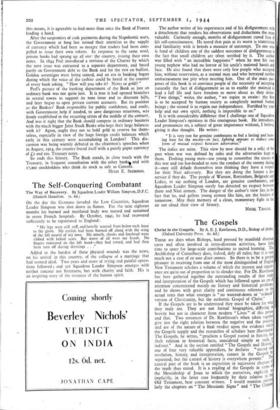The Self-Conquering Combatant
The Way of Recovery. By Squadron Leader William Simpson, D.F.C. (Hamish Hamilton. 7s. 6d.)
ON the day the Germans invaded the Low Countries, Squadron Leader Simpson was shot down in flames. For the next eighteen months his burned and mutilated body was nursed and sustained in seven French hospitals. By October, 1941, he had recovered sufficiently to be repatriated to England : " My legs were still stiff, and heavily scarred from below each knee to the groin. My eyelids had been burned off along with the wing of the left nostril of my nose. My mouth, cheeks and forehead were ribbed with keloid scars. But worst of all were my hands. No fingers remained on the left hand—they had rotted, and had then been torn off during dressings . . ."
Added to the burden of these physical wounds was the news, on his arrival in this country, of the collapse of a marriage that had seemed ideal. Two years and more of trying and painful opera- tions followed ; and yet Squadron Leader Simpson emerges with neither rancour nor bitterness, but with charity and faith. His is an inspiring story of the resource of the human spirit. The author writes of his experiences and of his disfigurement with a detachment that renders his observations and deductions the more valuable. Curiously enough, months of disfigurement cured him of his self-consciousness. He noted that pain at its worst is transitional and familiarity with it breeds a measure of contempt. To one who is fond of children one of the saddest outcomes of disfigurement is the fact that small children are often terrified by it. The author was filled with " an incredible happiness " when he met his very young nephew who had no horror of his uncle's maimed hands and face. He also found that there were only few people who accepted him, without reservation, as a normal man and who betrayed .neither embarrassment nor pity when meeting him. One of the main pur- poses of this book is to convince people of the necessity of accepting naturally the fact of disfigurement so as to enable the maimed to lead a full life and have freedom to move- about as they desire. " Two things," writes the author, " we aspire to attain: the first is to be accepted by human society as completely normal human beings ; the second is to regain our independence. Fortified by your help and our own spirit, nothing is impossible to us."
It is with considerable 'diffidence that I challenge one of Squadron Leader Simpson's opinions in this courageous book. He introduces, and pronounces on, a subject of great importance without, I believe, giving it due thought. He writes :
" It is very rare for genuine combatants to feel a lasting and burn- ing hate for the enemy—in fact, fighting appears to induce some form of mutual respect between adversaries."
The italics are mine. This view by now should be a relic of the past when war was defined by rules and the adversaries kept to them. Dashing young men—too young to remember the causes of this war and too hot-headed to note the conduct of the enemy during it—may still delude themselves into thinking they have a respect for their Nazi adversary. But they are doing the future a dis- service if they do. The people of Warsaw, Rotterdam, Belgrade and Lidice, to say nothing of London, are genuine combatants, and Squadron Leader Simpson surely has detected no respect between them and Nazi airmen. The danger of the author's view lies in the fact that he, and gallant young airmen like him, are the leaders of tomorrow. May their memory of a clean, momentary fight in the air not cloud their view of history.
NIGEL TANGYE


























 Previous page
Previous page